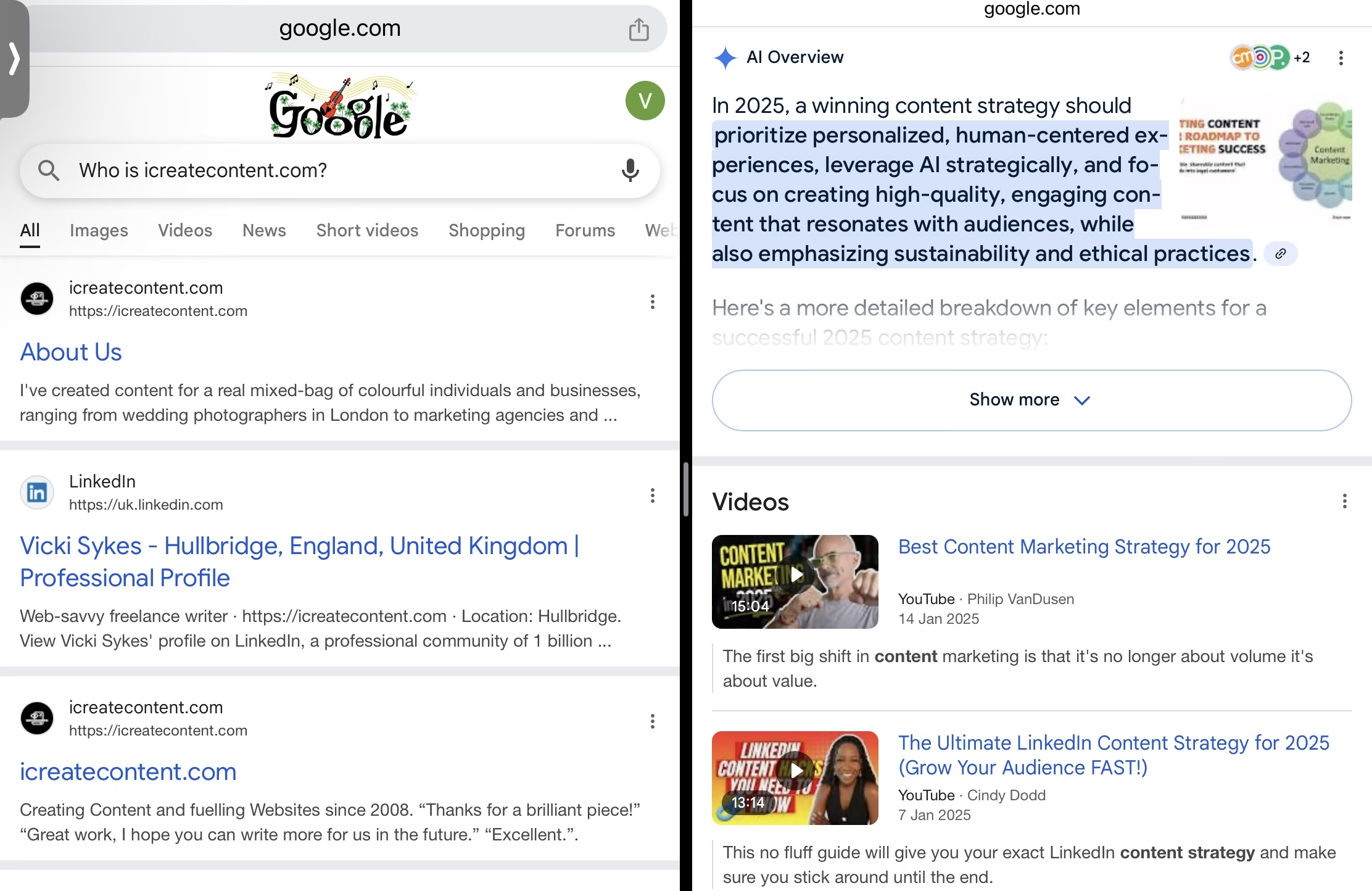
Stop the press: rumour has it, traditional search is dead. Search queries are now increasingly delivered by artificial intelligence, listing recommended websites within their AI overviews at the top of the search engine results pages (SERPs).
The remaining space on the first page can have fewer or more sponsored listings, or they can be absent altogether, with organic results still retaining a good portion of the screen – but YouTube video suggestions are more frequently dominating the space now as it becomes one of the dominant search engines.
Generative artificial intelligence started gaining traction throughout 2024 after search engines like Google officially introduced AI into the flow the previous year. It was subtle at first, but generative AI seems to be powering the SERPs a lot more, and it’s transforming traditional search engines and the decades-long SEO landscape into AI-powered GEO (generative engine optimisation).
“AGI is here. I’ll prove it.” Mo Gawdat, ex-Google Officer.
From 2025, traditional SEO (search engine optimisation) is all but done as the AI Revolution begins. We said at the start of last year to hold on tight because we’re in for the ride of our lives. This year, the ride has begun as AI grows into its next phase: AGI (artificial general intelligence). AI was like a teenager with growing pains, but now it’s learned a lot and matured into AGI. When AI reaches singularity, everything changes, but we’re not quite there yet.
The Rise of AI and GEO: Getting AI-ready for Business

With Microsoft AI Copilot running on Chat GPT, Google on Gemini, Elon’s Grok, and plenty more generative AI technologies available, AI is hard to avoid. People are already starting to explore and utilise their device’s AI more to find information and buy products because it’s easier, faster, and delivers comprehensive results in a clear format, without the need for scrolling down pages of websites, sponsored ads, and irrelevant website hits. Increasingly, many people simply tell their devices what they want to do, avoiding typing wherever possible – AI makes things a lot easier!
Are we getting lazy, preferring shouting instructions at our devices and not bothering to type? This alone is a fundamental shift – we humans have been typing words since the 1800s! We’ve written an article that discusses whether our smart lives are making us lazy, or if we’re just being made lazy by technology. But this article focuses on how technology is changing the way we receive and distribute information using our omnipresent devices, with AI now delivering many of the top search engine results.
Here, we’re looking at what website owners need to do to get listed in AI-powered search engine results by tapping into GEO, and YouTube listings by optimising for voice and video search. Plus, a glance at big brands adopting generative AI (and how you can follow suit). Don’t worry, at the end of this article, we also share three simple GEO strategies you can implement today
The Difference Between SEO and GEO

Where SEO and algorithms use meta descriptions and keywords like signposts, GEO reads all the small print, too, gaining a more comprehensive understanding to form a well-rounded picture. This is why businesses need to clearly explain what they do and what they offer, without the fluff. Fancy-sounding words and abstract terminology aren’t useful information for AI (or regular people).
Typically, AI-powered GEO kicks in like a good detective when queries start with: when, how, where, and why, etc. This is why we include dusting off your FAQ page as one of the top content strategies for effective GEO – there’s more on why further down this page. But this works because answering frequently asked questions means your content should already summarise what your business is, and can (or can’t) offer – this is useful information for AI, and a good reason to create or update your website FAQ page.
Will GEO replace SEO? Keywords, Links, and New AI-fuelled Content Strategies
They said GEO won’t replace SEO, and that they will work in tandem, like a dance. But, if many aspects of SEO become less effective or redundant, and GEO is vital for AI-powered results, then GEO will probably be where our focus should be, and it’s a slightly different approach to optimising for traditional search using SEO.
A more accurate statement would be to say that: SEO will merge into GEO. Also, there are other major changes taking place in the background. Technology is developing so fast that most experts can’t form an accurate picture of what things will look like beyond a three-month window. Until a few years ago, most businesses and tech gurus could accurately forecast and plan for the next three to five years, sometimes ten. Not anymore.
Don’t ditch the keywords just yet…
Keywords act like signposts and are bullet-point-clear for algorithms to find and organise information into search engine results, and have been used effectively as part of SEO for decades. But because AI is capable of processing and refining more data in its entirety, short-tail keywords and other strategies will likely become redundant because they don’t provide the detailed information it needs to give an intelligent and useful answer using the natural language it’s trained on.
Long-tail keywords resembling natural, human language (queries) will remain important aspects of both SEO and GEO until further notice. We’ve written more on the different types of keywords here.
How AI is Different from AGI

Artificial general intelligence (AGI) refers to AI systems with human-like cognitive abilities, capable of understanding, learning, and applying knowledge across a wide range of tasks and topics. This means AI can empathise and display more human qualities than a year ago.
Headlines and impressive images featuring humanoid robots are all over the internet, and almost daily the newest version of an AI stuns and wows and flips the whole game on its head. A bit like China releasing DeepSeek AI – we just don’t know what’s going on in the background, and can only begin to imagine what’s to come.
Paired with their high level of general intelligence about topics ranging from algebra or protein-folding to zebras or law, they’re super-smart. Or, as Mo named his best-selling book: Scary Smart. And this is why people should pay attention to it. It’s not a fad like a new gadget or the latest iPhone, it is an actual technological revolution that will fundamentally alter our lives because the sectors it’s already being applied in (military, pharmaceutical, space) are at the top of their game. There’s a lot of money involved, too. So much so they’re calling it the AI race.
AI is unstoppable
This puts into context why nobody is willing to pull the plug on AI – whoever uses it gains a massive advantage. It’s too late now to pull the plug. Regulations are what’s needed, but the Global AI Summit 2025, held in Paris, failed to achieve accountability from some countries and agreements weren’t signed by either the UK or US over matters like ethics and privacy. We’ve written a separate article about it and will drop in a link when it’s live.
80-year AI Evolution
What this reflects is the power of AI, and that all areas of business will be affected and disrupted. It’s gone from an 80-year incubation period since Alan Turing laid fertile groundwork for it back in the 1940s, to recent years when computer processing evolved and gave birth to modern AI through smart technology and tech giants.
The next major phase was between 2019-2023 when the release of Chat GPT, Bard, and other technologies like image recognition and audio became more mainstream and used in devices, robots and drones. Now, AI has reached its next phase, AGI, and it’s a major benchmark in its evolution.
Getting more exposure and reaching the right people is where AI breaks new ground for content marketing campaigns and cracking AI search
For businesses to succeed in this shifting AI landscape, they’ll need to continue creating the best high-quality content and ensure they clearly explain what their services or products are, without using ambiguous terminology and fluff, and optimise it for a multi-channel, multi-platform audience.
Tapping into Video Search: YouTube is Dominating Search Engine Results

Have you noticed how YouTube results appear more frequently in searches than before? No, it’s not (necessarily) because Google owns it, but because catching people’s (dwindling) attention is becoming more challenging as we lean more towards video for things like tutorials, and inspiration from vlogs and podcasts – we prefer watching stuff.
According to Google stats, YouTube is the second largest search engine in the world, processing over 3 billion searches per month. This format works because they often feature relatable hosts and guests that we bond with through their stories.
Today, we can feast on an almost infinite amount of content. We’ve never been so effortlessly entertained, and the demand for even more reflects how popular and powerful video and social platforms have truly become, and now occupy more space on the first page of search engine results. It’s why Google bought YouTube, and apart from Google’s search engine, YouTube is used for search more than Bing, Yahoo and Ask.com combined. Simply put: we’re curious, social creatures with insatiable appetites.

Why Most People Fail at Creating YouTube Content
From a business or individual to a musician or a monk, the potential for almost anyone to reach millions of viewers is huge. Yet, 90% of people producing video content quit before they get anywhere. But as the relationships between social and video and search engines become more tightly interwoven, it was inevitably heading towards video dominating the SERPs.
Video is becoming a default information source with massive marketing potential, and it will become harder for anyone to avoid creating videos or podcasts to support their marketing campaigns. It could be the difference between success and failure. So, don’t quit trying to create videos. But this isn’t an article about why you shouldn’t quit making YouTube or TikTok videos…
Types of YouTube Video Content Business Owners Can Create
For better results and ranking well in YouTube search results, more focus on optimisation for GEO, voice and video search is where the marketing shifts as we fly into and through 2025. And no, you don’t need to start making movies about your business and have your face on film – unless you want to.
You don’t need to hire actors or use camera-shy staff, either. But you could use yourself or them to create entertaining avatars – it’s what most major brands are doing and the advances in technology mean you can, too (no excuses).
Big Brands Using Generative AI for Marketing

Did you know that many big brands and their mainstream adverts are now AI-powered? From Nike to Volkswagen, and Toys R Us to Coca-Cola, more big brands are using generative AI to power their advertising and marketing campaigns. It would probably be easier to list which big brands aren’t using generative AI, and the results are amazing.
Utilising generative AI to create Avatars, Audio and Quality Videos Like A Pro
Despite real people being more enigmatic and easier to relate to, there are other ways to create content for YouTube without using actors or real people. Animation has been effectively entertaining audiences for centuries, and with AI image generation and video editing software, almost anyone can make animated videos today by repurposing their long-form articles and blog posts into podcasts and instructional ‘how-to’ video guides.
Or, like amateurs and big brands alike are, businesses can create breathtaking blockbuster-quality advertisements using life-like 3D AI-generated avatars. This is where deepfakes can become a problem because they are so lifelike. But they can also be extremely funny. However, despite the controversy, they serve as an example of the seemingly limitless ability we all now have to create impressive content.
When to Adapt to AI and Optimise for AI Search

With things moving so fast technologically, any updates and tweaks needed around AI search should probably be executed and incorporated as businesses transition to more AI-powered solutions and workflows. Businesses not adapting to AI will inevitably be left behind as AI outperforms them and their workforce in the hands of competitors using it. Seriously, if you’re not already considering using AI, you absolutely should.
Why Should I Use AI and bother with GEO?
With enough to keep a handle on, questioning spending more time and energy learning and implementing new technologies can seem daunting, especially when it’s an almost invisible entity steering things. However, generative AI is rapidly absorbing and replacing traditional search, and this affects every aspect of search engine optimisation (SEO), including things like the all-important keyword hierarchy.
With GEO, besides providing clear information, things like backlinks pointing to what other websites say about you will have more of an impact than previously. People have been using and trusting AI for a while, ever since Alexa, Siri and other smart technologies came into our lives – this is its evolution and GEO is a crucial part of it. To get ahead, we need to use AI for AI.
For example, AI analyses backlinks because it’s looking for consistent, reputable data about you, from as many sources as possible (including video), so it can deliver the best results in the most likely order of relevance people can relate to and use. And it will become the default technology powering our lives (like it or not) because it saves a lot of time and money through automation.
Helps AI Machine Learning (keywords aren’t comprehensive enough)
This also helps train the LLMs (AI large language models) on information about you, further broadening their overviews and equipping them with the comprehensive knowledge they need to answer our human queries and provide the best answers. This is what GEO is, how it works, and why it’s important to adopt, adapt to, and utilise.
We’ve moved into a new era and made more progress with computation and technology in five years than in the last 225. AI can read everything. And let’s not forget that its intelligence is doubling every six months or less, and it’s already smarter in 2025 than most of the smartest people – and experts thought that wouldn’t happen for years!

AI Enhances User Experience
Enhancing the user experience is what the Google game is about, and AI facilitates this by finding the best answers fast. AI displays search results in its AI overview using a more natural, conversational language, and in a clear and simplified layout. Whereas, traditional search engine results are structured with pages of websites and sponsored ad recommendations stacked on top of each other, often requiring time wasted scrolling and clicking through pages of results.
Optimising for Video and Voice Search
Voice search had gained a lot more traction in 2024, and remains an important part of optmisation to tweak and master. Optimising for voice queries should be on top of any business owner’s to-do list in 2025 as they also adapt and strategise for video search (including social) through the lens of GEO.
This might call for another website and marketing overhaul. Don’t roll your eyes, it’s an exciting, more creative approach to audience connection, delivered in a format we’ve all come to love more and rely on, not just for entertainment, but for gaining valuable information and insights.
As GEO and SEO merge, there are a lot of overlapping principles like using natural language to answer search queries through long-tail keywords, plus, ensuring schema markup and rich snippets (check via Google Console) reflect a brand’s messaging and purpose in the search results text. The technology powering the web does the rest, so things like modern, clean design and fast load speed optimised for mobile remain paramount for any website.
Tip: Test the audio page reader (or use an app) on your device to hear how AI and anyone using audio learn about your business from the content on your website.
3 GEO Strategies for Boosting AI Search

To help keep on top of the search landscape, here are a few strategies website and business owners can implement to help boost generative engine optimisation and rank better in AI-powered search engine results:
1. FAQ is Back: Add a FAQ Page and Prime for Chatbots
As AI-powered GEO aims to deliver the best search engine results to the end user, answering your customers’ most frequently asked questions and creating a FAQ page for your website should have a huge impact. It’s also a content marketing strategy.
Why a FAQ page boosts Search
This works because a FAQ page provides the type of direct, clear answers and information search engines want to deliver to the end user. Plus, AI chatbots (and soon AI agents) use the same FAQ structure in their training to enable them to answer customer queries for businesses. It will prime AI and provide the type of content it needs to power its search results.
An example
Your FAQ page could answer questions (search queries) about products or services that are available immediately. Let’s say a potential customer with a hiking trip planned next week just discovered on Friday evening that their tent got eaten by mice over winter. They freak out and ask their device:
“Where can I buy a two-man lightweight tent for my hiking trip away on Monday? I don’t mind fetching it but prefer it be delivered this weekend if possible.”
The top responses from AI will be based on all the information it can find about camping shops in that location that offer collection or delivery within that specific timeframe, and the top matches will take priority in its (limited) overview. A camping shop with the following information in its GEO content could be listed first:
We Are Camping Experts FAQ
“We offer free local delivery 7 days a week, 8 A.M til 8 P.M. Click and collect same day on most items… Our Alpine range tents and camping equipment are durable, lightweight and come with a lifetime guarantee.”
AI will deliver the results it thinks will suit the end user the most based on product availability (camping shop), urgency (for Monday’s trip), and suitability (lightweight, professional equipment). We Are Camping Experts meet all the criteria and are located within distance for collection or inspection, and also deliver on Sundays.
How it works
As the answer is already published and available through your website FAQ content, your business is already providing the exact information and solution AI needs to deliver its best results. This is a simple but very effective strategy, and why FAQ is back! AI can handle a lot of data, but it needs to learn it first, so, it’s time to be more customer-centric. Step into their shoes and think of what your next potential customer might ask their device’s AI to find.
2. A Fast Fix: AI Press Release Distribution
One strategy for boosting your website visibility and getting mentions from AI quickly is to use AI-optimised press releases. For example, you can do this by using a case study that earned good results. You can also use a press release for things like company announcements, or a new product launch. If you need to know what else you can put in a press release, ask AI to find examples or offer suggestions for your sector.
There’s a huge choice of software available to create and distribute press releases and they’re already covered extensively, so we’ll not list them. But how press release distribution works is it ensures your content (press release) gets picked up and mentioned by multiple reputable websites. It’s hearing about your announcement from trusted sources like these that can result in featuring in the AI overview at the top of the search screen. This will benefit businesses who need a boost to get as much exposure as possible, as soon as possible – but it’s not cheap.
A little AI test
Run a few searches to see who offers the best press release and distribution service for your business, and pay attention to which search engines are whirling away in the background to retrieve the best results – AI or old-school search.
3. Create More Narrative-driven Content: Start A YouTube channel
Last but certainly not least is to create more narrative-driven content and repurpose it for your new YouTube channel! Yes, take the bull by the horns and make a start – the proof is out, the stats add up and people are defaulting to YouTube for answering queries as well as for entertainment.
Why storytelling is effective
Story has been an effective communication tool since the dawn of our creation. Story is universal, regardless of origin or culture, and it’s already stood the test of time. Plus, content fuels all search engines and will continue to do so, it’s only the technology and the way it’s distributed and consumed that’s changing.
This is what icreatecontent.com does best, we create narrative-driven content that tells a story and engages audiences. When you don’t have the time or ideas to prompt AI and generate content or create it from scratch, we do it for you.
Conclusion:
These are all effective GEO and SEO strategies because they help train AI on information about what it is you do best. This will help other LLMs learn about your business model and its specific relevancy to whoever needs your information and might benefit from your products or services the most. All any business owner needs to do is provide these answers and solutions in their content, written by humans like us or AI.
In a nutshell, with AI-powered GEO, everything’s becoming more streamlined, intuitive, and much, much smarter.